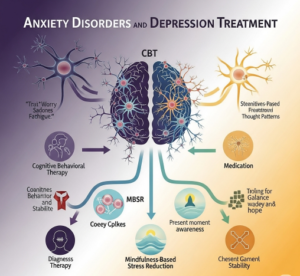The global anxiety disorders and depression treatment market was valued at USD 8.50 billion in 2019 and is expected to grow from USD 10.89 billion in 2020 to USD 13.03 billion by 2027, reflecting a compound annual growth rate (CAGR) of 2.6% during the 2020-2027 period. In 2019, North America led the market, accounting for a 52.24% share. Our analysis indicates that the market experienced remarkable growth of 28.2% in 2020.
The Anxiety Disorders and Depression Treatment Market encompasses a broad spectrum of therapeutic approaches aimed at managing and alleviating symptoms associated with mental health conditions such as anxiety and depression. This market includes pharmacological treatments like antidepressants, anxiolytics, and antipsychotics, as well as non-pharmacological options such as psychotherapy, cognitive behavioral therapy (CBT), and digital mental health solutions. Growing public awareness, increasing diagnosis rates, and rising demand for personalized and accessible mental health care are driving market growth. The market serves diverse patient populations across age groups and geographies, with a focus on improving treatment outcomes, reducing stigma, and expanding access to timely and effective care. As mental health continues to gain recognition as a global health priority, the Anxiety Disorders and Depression Treatment Market is expected to evolve significantly in the coming years.
Tariff Impact Analysis for Anxiety Disorders and Depression Treatment Market:
https://www.fortunebusinessinsights.com/anxiety-and-depression-treatment-market-102787
Anxiety Disorders and Depression Treatment Market Overview
The Anxiety Disorders and Depression Treatment Market is experiencing consistent growth due to increasing mental health awareness, evolving therapeutic options, and rising global incidences of anxiety and depression. A shift toward personalized medicine and the integration of digital health tools further contribute to the market’s expansion.
Market Segmentation:
The Anxiety Disorders and Depression Treatment Market is segmented based on several key factors that shape its structure and growth potential. By drug class, the market includes antidepressants, anxiolytics, antipsychotics, mood stabilizers, and herbal or alternative treatments. Antidepressants remain the dominant segment due to their broad application in both anxiety and depressive disorders. Anxiolytics, often used for short-term relief, also account for a significant portion of the market.
Another important segmentation is by the type of disorder. The market serves patients with generalized anxiety disorder (GAD), social anxiety disorder, panic disorder, major depressive disorder (MDD), and postpartum depression, among others. Each disorder type requires unique therapeutic strategies, which diversifies product development and clinical approaches.
Age group segmentation includes adolescents, adults, and the elderly, with each group having distinct diagnostic and treatment needs. Lastly, distribution channels such as hospital pharmacies, retail pharmacies, and online platforms further segment the Anxiety Disorders and Depression Treatment Market, influencing how patients access treatment based on geography and healthcare infrastructure.
List Of Key Companies Profiled In Anxiety Disorders and Depression Treatment Market:
- Pfizer Inc. (New York, U.S)
- Lundbeck A/S (Denmark, Europe)
- GlaxoSmithKline plc (Brentford, U.K)
- Merck & Co. Inc. (New Jersey, U.S)
- Eli Lilly and Company (Indiana, U.S)
- Johnson & Johnson (New Jersey, U.S)
- AstraZeneca (Cambridge, U.K)
- Bristol-Myers Squibb (New York, U.S)
- Other Players

Market Growth
The Anxiety Disorders and Depression Treatment Market is on a strong growth trajectory, fueled by a global surge in diagnosed mental health conditions and a greater emphasis on psychological well-being. The growing availability of innovative drugs, therapies, and supportive digital platforms is improving access and adherence to treatment. Additionally, increasing acceptance of mental health care in both developed and developing regions is expanding the patient pool.Driving Factors:
Restraining Factors:
Despite the strong growth trajectory of the Anxiety Disorders and Depression Treatment Market, several restraining factors continue to limit its full potential. One of the most significant barriers is the persistent stigma surrounding mental health. In many regions, individuals hesitate to seek help due to societal judgments, which results in underdiagnosis and untreated cases. Additionally, side effects associated with conventional medications such as antidepressants and anxiolytics often lead to poor treatment adherence. Many patients discontinue therapy due to weight gain, sexual dysfunction, or drowsiness, which impacts overall treatment success. High treatment costs also pose a major challenge, especially for advanced therapies or long-term care options. In low- and middle-income countries, limited insurance coverage and out-of-pocket expenses restrict patient access to appropriate care. Moreover, the shortage of mental health professionals, particularly in rural or underserved regions, contributes to diagnostic delays and inadequate follow-up. Lastly, overlapping symptoms between anxiety, depression, and other psychiatric or physical health conditions can lead to misdiagnosis, complicating the effectiveness of treatment regimens. These challenges collectively act as restraining factors for the Anxiety Disorders and Depression Treatment Market and must be addressed to ensure broader and more effective care delivery.
Regional Analysis:
North America leads the market, attributed to robust healthcare infrastructure, higher diagnosis rates, and widespread use of prescription drugs for mental health. Europe follows closely, supported by national mental health policies and universal healthcare access. The Asia-Pacific region is expected to witness the fastest growth, driven by rising mental health awareness, urban stress, and government-led initiatives to improve psychiatric care. Meanwhile, Latin America, the Middle East, and Africa show moderate potential, with growth dependent on increased funding, training, and public education campaigns.
Key Industry Developments:
- July 2021 – Alembic Pharma received USFDA approval for desipramine hydrochloride tablets (10 mg to 150 mg) for depression treatment.
Contact Us:
Fortune Business Insights™ Pvt. Ltd.
9th Floor, Icon Tower,
Baner – Mahalunge Road,
Baner, Pune-411045,
Maharashtra, India.
Phone:
U.S.: +1 424 253 0390
U.K.: +44 2071 939123
APAC: +91 744 740 1245
Email: [email protected]